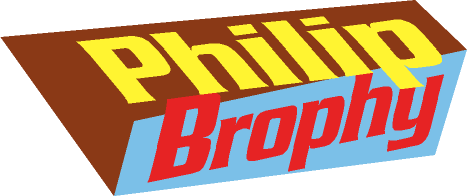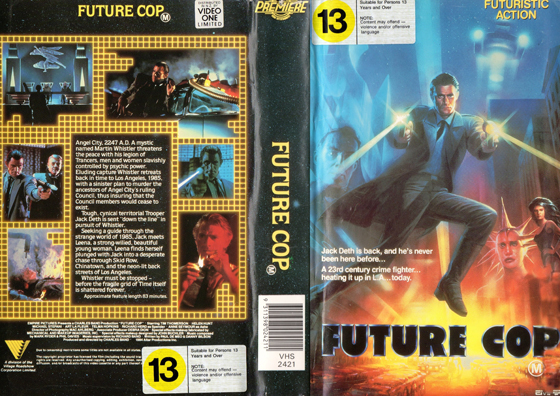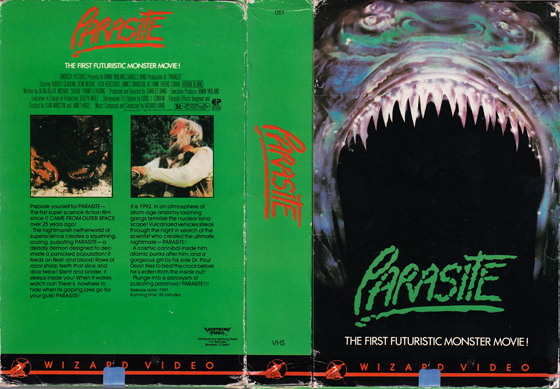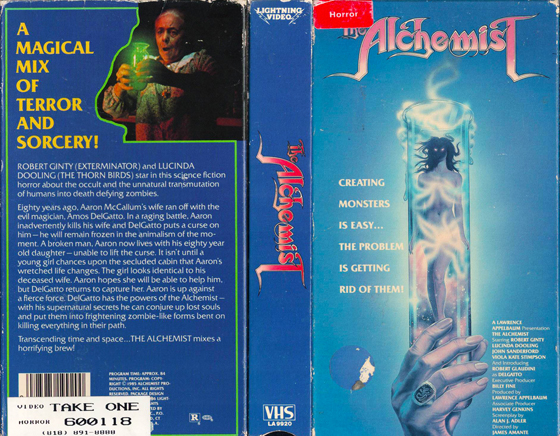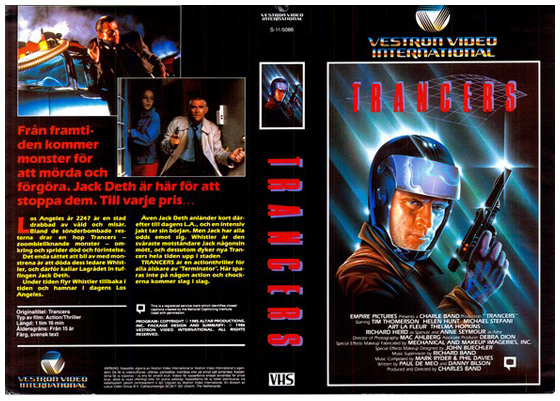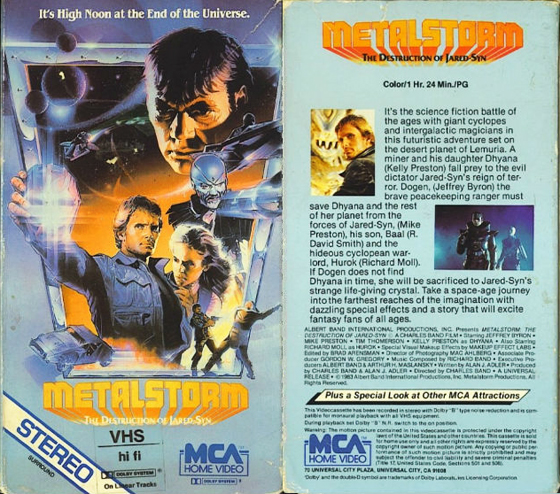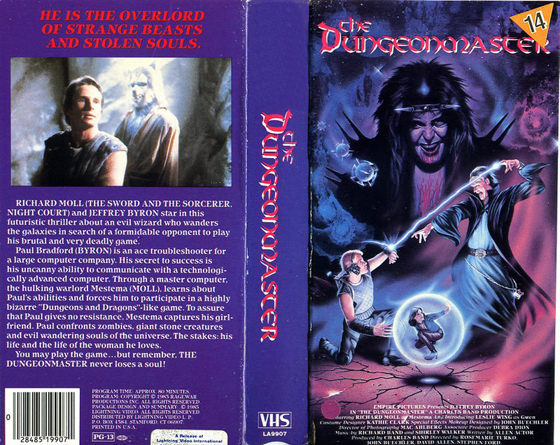 Charles Band
Charles Band
Exploitation Videos 11
published in Video Age, May 1986, MelbourneThere are many categories of the auteur director in Exploitation. The Hack Director is the lowest - he not only simply does it for the money, but he also would try to make a sensitive modern love story if he were paid enough money. The Shlock Director is someone who has got his politics worked out: he makes trash (and only trash) because he believes that's where the money is. And then, hiding out among all the shlock directors, is the occasional Crack Director — one who can crack a good movie. Not a director who has plummeted, succumbed to or fallen prey to the wide world of Exploitation, but a director who positively, intentionally and creatively acknowledges the parameters of Exploitation and works within them. In other words, Altered States, The Company Of Wolves, Liquid Sky, etc. might be Big A art, but they sure aren't Big X art.
Charles Band is a genuine Crack Director. Not as big a name as Cronenberg, Carpenter, Craven or Cohen, but definitely a director who has, for the past eight years, consistently and unerringly produced or directed exploitation flicks that really flicker with an ironic twist, a slight edge, a perverse touch, an inventive slant.
Son of producer/director Albert Band (an American in Rome who cooks up antipasto epics and spaghetti westerns), Charles Band produced his first feature at the ripe age of 21 — Mansion Of The Doomed (1977). He then went on to produce Laserblast (1978), The Tourist Trap (1979) and The Day Time Ended (1980). He also produced about another six films not directly related to the horror/fantasy field, but I've never found mention of these titles anywhere, apart from Fairytales (1980), a soft-core sex-comedy based on Grimms' tales and definitely one of the better films in this particular sub-genre.
Charles Band's directorial debut was The Alchemist (1981), an unusual story of witchcraft, alchemy and dark forces set in 1955 — predating the recent trend in setting fantasy films in the immediate past. Band really made his mark with Parasite (1982), the first horror 3-D film that came hot on the heels of the Western spoof in 3-D, Comin' At Ya! Parasite most clearly demonstrates Band's working method: take a variety of proven contemporary Exploitation elements and combine them to produce something original and unusual. With creature designs by Stan Winston, Parasite mixes Alien (minus the space) with Mad Max (minus the cars) and Shivers (minus the sex). A calculated and precise fusion that gives us a very interesting post-apocalypse story by virtue of some inventive direction.
Concurrent with Band's burgeoning film career was his involvement in the video industry. Acquiring the rights to Carpenter's Halloween, Band established himself with his Media Home Entertainment. He then formed one of the best-known Exploitation video companies, Wizard Video, spreading the gore word onto people's small screens with Zombie, I Spit On Your Grave (Palace), and The Texas Chainsaw Massacre (K-Tel). He then really exploded his market with the long-awaited video release of H.G. Lewis' Blood Feast and 2000 Maniacs and Texas Chainsaw Massacre. Now that's what I call credentials.
Straight after the success of Parasite came Metalstorm (1983), Band's second 3-D movie. Metalstorm is a bit of a low-point for Band, but even this Mad Max quickie-clone went towards establishing him as a young movie mogul to be reckoned with in the low-budget arena. Yet despite its derivative nature (it even features the "star" of Mad Max II: Mike Preston!) Metalstorm gained the quick profit Band sought and helped further establish the SPFX-makeup work of Doug White and his newly-formed company, Makeup Effects Lab. Band was obviously influenced by Roger Corman's proven theory: hire newcomers for next-to-nothing and everyone involved can benefit from it.
1984 was the year things really started cooking. Band formed his own film company — Empire International Pictures — and moved from making three films at once to working on any number up from six! One of two films Band directed in '84 was Trancers (released here theatrically and now on Video from Premiere Home Entertainment as Future Cop). This off-beat mixture of Philip Marlowe, Bladerunner and the LA punk scene is perhaps his best film to date. Band's other 1984 film was Dungeon Master (also known at times as either Ragewars or Digital Knights from Vestron). During production, it expanded into a sort of mini-anthology film involving seven directors. Dungeon Master tells the story of old magic (in the guise of the Devil) versus new magic (in the shape of a young computer genius). Imagine Electric Dreams combined with Jason & The Argonauts.
Dungeon Master is virtually an advertisement for Empire International, showcasing directors who have had and continue to have strong working connections with Band's company. Apart from Band, there is SPFX maestro John Beuchler (who had just signed a major deal with Empire to provide SPFX for what seems to be an endless series of films); Rosemary Turko (director of Scarred, 1983); David Allen (a recognised "godson" of Ray Harryhausen's stop-motion animation work); Ted Nicolaou (an experienced editor of low-budget films); Stephen Stafford (with experience in television); and Peter Manoogian (a NYU film-school graduate). If Band's Empire International does see him to be the "Corman of the 180s," then remember those names!
Apart from directing films, Band has spent time producing films, developing scripts and initiating projects. Swordkill (1983) directed by J.Larry Carroll, put a reincarnated samurai warrior slap in the middle of downtown LA, giving us a slasher film of a different kind. Ex-actor Lucca Berovici was given his chance to direct Ghoulies (1984) which featured Jack Nance (Eraserhead) in what appears to be a Gremlins ripoff (it is) but has some memorable comic characters in it, plus Beuchler's cute little critters.
Panning out from the directorial showcase of Dungeon Master, Empire International has since produced The Re-Animator (1985) (directed by Stuart Gordon and based on a series of H.P. Lovecraft stories, this film is gory!) and Terrorvision (1986), directed by Ted Nicolaou. In post-production is John Beuchler's gore fantasy Troll (1986) and Dave Allen's stop-motion animation epic Primevals (1986).
There is a reason for this increased production at Empire. At the end of 1984, Band showed just how much suss he had in the creative survival aspects of Exploitation production by signing a lucrative deal with an American video company which was to fund Empire International movies to the tune of about $4 million per pic in exchange for the exclusive video rights six to nine months after the films' theatrical release. Band knows very well the limited theatrical life of such films and has thus obtained bigger budgets for their production with not much skin off his nose. The guy's business moves are just as wily and inventive as his movies.
So what is Empire working on now? Take your pick: Journeys Through The Dark Zone; Zone Troopers; Altereo; Mandroid (a.k.a. The Eliminators); Matt Riker: Mutant Hunt; Breeders; Lazerblast II; Crimson; and Crawlspace. That's around 28 movies in just over nine years. From the Hack to the Shlock to the Crack — there's only one Charles Band.
Text © Philip Brophy 1986. Images © respective copyright holders
